Issue 08. 11 June 2012 - UWA Staff - The University of Western ...
Issue 08. 11 June 2012 - UWA Staff - The University of Western ...
Issue 08. 11 June 2012 - UWA Staff - The University of Western ...
Create successful ePaper yourself
Turn your PDF publications into a flip-book with our unique Google optimized e-Paper software.
<strong>UWA</strong> NEWS<br />
<strong>11</strong> <strong>June</strong> <strong>2012</strong> Volume 31 Number 8<br />
Photo © Ian Ferguson<br />
<strong>The</strong> SKA group, including <strong>UWA</strong> and Curtin partners, celebrate the decision. Peter Quinn is in the white shirt in the middle<br />
Achieving universal excellence<br />
By Lindy Brophy<br />
After years <strong>of</strong> research, months <strong>of</strong> planning and weeks <strong>of</strong><br />
waiting, the decision finally went our way.<br />
<strong>The</strong> much-anticipated Square Kilometre Array – the world’s most<br />
powerful radio telescope – will be built in the Murchison region <strong>of</strong><br />
WA … and in South Africa.<br />
<strong>The</strong> SKA Organisation board <strong>of</strong> directors has shared the world’s<br />
biggest science project between the two best sites.<br />
Nearly three years ago, the International Centre for Radio<br />
Astronomy Research (ICRAR), a joint venture between <strong>UWA</strong> and<br />
Curtin <strong>University</strong>, was launched, with the headquarters based on<br />
our Crawley campus. It started with $20 million from the State<br />
Government <strong>of</strong> WA to grow new skills and develop new<br />
capabilities to give WA the best chance <strong>of</strong> hosting the SKA.<br />
ICRAR is now a Centre with funding <strong>of</strong> around $130 million and<br />
has grown quickly in the past three years to 70 staff and 35<br />
graduate students.<br />
As deadlines came and went earlier this year, it looked<br />
increasingly as though a compromise would be reached. But<br />
ICRAR director, <strong>UWA</strong> Pr<strong>of</strong>essor Peter Quinn, says the final<br />
decision plays to the strengths <strong>of</strong> both sites, as well as utilising<br />
the existing investment by both teams.<br />
M81 spiral galaxy Photo: NASA/JPL-Caltech/ESA/Harvard-Smithsonian CfA<br />
In this issue P3 imaginary diseases P5 visions <strong>of</strong> australia P<strong>11</strong> geothermal power is hot
Achieving universal excellence from page 1<br />
“<strong>The</strong> low and middle frequency components to be deployed at<br />
the Murchison Radioastronomy Observatory (MRO) in the first<br />
phase <strong>of</strong> the SKA will concentrate on the survey science<br />
aspects <strong>of</strong> the SKA mission,” he said.<br />
“<strong>The</strong> MRO is a fantastic site for low and middle frequencies<br />
due to the lack <strong>of</strong> FM radio and mobile phone interference.<br />
<strong>The</strong> Republic <strong>of</strong> South Africa site will focus on the high<br />
frequency mission <strong>of</strong> the SKA, which will benefit from the<br />
attributes <strong>of</strong> that site.<br />
“ICRAR is at the right place at the right time to benefit from<br />
this announcement. We have exactly the skills and capacities<br />
to begin contribution to both the SKA technologies to be<br />
placed in WA through our involvement in information and<br />
communication technology, international low frequency<br />
aperture array technology research and the Murchison<br />
Widefield Array project.”<br />
As the final decision drew closer, ICRAR staff and supporters<br />
were gathered at their <strong>UWA</strong> base on the night <strong>of</strong> Friday<br />
25 May. With them were some <strong>of</strong> the ICRAR Board members,<br />
Dr Bernard Bowen, Pr<strong>of</strong>essor Alistar Robertson, Phillip Jenkins<br />
and Graham McHarrie, as well as a team from the State<br />
Department <strong>of</strong> Commerce, including the Minister for Science,<br />
John Day.<br />
“We heard the announcement from the Netherlands about<br />
8pm,” said Dr Renu Sharma, general manager <strong>of</strong> ICRAR.<br />
“Peter (Quinn) opened a bottle <strong>of</strong> champagne and we all<br />
celebrated. It was very exciting, after such a lot <strong>of</strong> hard work<br />
by everybody.”<br />
M42 <strong>The</strong> Orion Nebula (Photo: NASA, ESA, M Roberto, Space Telescope Science Institute/ESA)<br />
Pr<strong>of</strong>essor Quinn said the dual site decision had been taken<br />
after the SKA Organisation looked at the best options and<br />
ensured that a dual site was scientifically possible.<br />
“One <strong>of</strong> the big benefits is that both sites will be able to use and<br />
build on our existing infrastructure,” he said. “Big investments<br />
have been made in the lead-up to the SKA site decision.<br />
Australia has invested more than $400 million already.”<br />
<strong>The</strong> new plan to share the SKA will see Australia’s Mid-West<br />
hosting two key components <strong>of</strong> the telescope – a group <strong>of</strong><br />
dishes equipped with Australian-designed multi-pixel radio<br />
cameras and the ‘Aperture Array’ portion, made up <strong>of</strong><br />
innovative, non-moving antennae designed to collect lower<br />
frequency radio waves from the whole sky.<br />
“This part <strong>of</strong> the SKA will be optimised to survey large portions<br />
<strong>of</strong> the sky quickly, a particular strength <strong>of</strong> Australian astronomy,”<br />
said <strong>UWA</strong> Pr<strong>of</strong>essor Lister Staveley-Smith, Deputy Director <strong>of</strong><br />
ICRAR.<br />
South Africa will host a complementary group <strong>of</strong> dish-shaped<br />
telescopes designed to observe smaller sections <strong>of</strong> the sky in<br />
more detail, following up on regions <strong>of</strong> interest discovered using<br />
the survey portion.<br />
“This model for splitting the SKA closely follows the workings <strong>of</strong><br />
other observatories around the world; <strong>of</strong>ten separate<br />
instruments will survey the sky and inform where another<br />
telescope should look closer,” Pr<strong>of</strong>essor Quinn said.<br />
“<strong>The</strong>se global science endeavours will continue to benefit<br />
<strong>Western</strong> Australia and the international scientific community<br />
long into the future. <strong>The</strong> effort Australia and WA has made in<br />
infrastructure, legislation and policies will make the Murchison<br />
Radio-astronomy Observatory a significant centre for global<br />
science for decades to come,” he said.<br />
“As an International centre, we’re eager to continue our work<br />
with colleagues in Africa and the rest <strong>of</strong> the world to build the<br />
SKA and use it to explore the Universe in 10,000 times more<br />
detail than ever before.”<br />
<strong>The</strong> SKA is a project for future generations. Completion is<br />
planned for 2024.<br />
Photo © Swinburne Astronomy Productions, design data provided by CSIRO<br />
2 | <strong>UWA</strong> NEWS <strong>11</strong> <strong>June</strong> <strong>2012</strong> the <strong>University</strong> <strong>of</strong> <strong>Western</strong> Australia
Is your<br />
illness all in<br />
your mind?<br />
Witches, vampires and werewolves<br />
were all part <strong>of</strong> the rich imagination<br />
<strong>of</strong> European society in the 16th and<br />
17th centuries.<br />
This early modern period was arguably<br />
the greatest age <strong>of</strong> the imagination and<br />
with it came ‘imaginary’ diseases and<br />
‘diseases <strong>of</strong> the imagination’.<br />
Intellectual historian Yasmin Haskell, who<br />
holds the Cassamarca Foundation Chair<br />
in Latin Humanism, has recently edited<br />
and published a book about it: Diseases<br />
<strong>of</strong> the Imagination and Imaginary<br />
Diseases in the Early Modern Period.<br />
Pr<strong>of</strong>essor Haskell has brought together<br />
social and literary historians from several<br />
different European cultures to examine<br />
psychosomatic illnesses, deeply-held<br />
beliefs that imagination could influence<br />
physical events, and scholarly debate<br />
over witches, vampires and werewolves.<br />
“My interest was sparked when I was<br />
looking at two very long Latin poems<br />
written by Jesuits in the 17th century,”<br />
Pr<strong>of</strong>essor Haskell said. “<strong>The</strong> poems were<br />
about chocolate and fishing but they<br />
both had lengthy digressions on a<br />
plague <strong>of</strong> hypochondria that was<br />
apparently afflicting people who were<br />
well educated.<br />
“‘Hypochondria’ was recognised<br />
as a real illness then, or rather,<br />
‘hypochondriacal melancholy’, an<br />
illness with physical and psychological<br />
symptoms which physicians <strong>of</strong> the<br />
time believed arose from disorders<br />
<strong>of</strong> the organs lying ‘beneath the<br />
cartilage <strong>of</strong> the ribs’ (the literal<br />
meaning <strong>of</strong> ‘hypochondria’).<br />
“Both the poets talked about it as a<br />
depressive illness from which they had<br />
suffered, an illness that could eventually<br />
lead to complete derangement.”<br />
Pr<strong>of</strong>essor Haskell, who is a chief<br />
investigator in the ARC Centre <strong>of</strong><br />
Excellence for the History <strong>of</strong> Emotions,<br />
secured an ARC grant, with Winthrop<br />
Pr<strong>of</strong>essor Sergio Starkstein, from the<br />
School <strong>of</strong> Psychiatry and Clinical<br />
Neurosciences, to look at the history<br />
<strong>of</strong> psychosomatic and somat<strong>of</strong>orm<br />
illnesses.<br />
“Nowadays, if we think somebody is<br />
imagining that they are sick, we say they<br />
have hypochondria, but in the early<br />
modern period (from about the late<br />
16th century to the early 18th century)<br />
hypochondriac illness would have been<br />
treated seriously by doctors – with<br />
drugs, dietary prescriptions and so on.”<br />
Along with that belief was serious and<br />
learned discussion about whether<br />
witches really ‘flew to the Sabbath’ and<br />
whether the devil could impersonate the<br />
dead, perhaps even create the illusion<br />
<strong>of</strong> vampires. Or did such creatures<br />
really exist?<br />
“<strong>The</strong>y were all very vexed issues; it was<br />
a frightening time,” Pr<strong>of</strong>essor Haskell<br />
said. “It was believed that if you suffered<br />
from melancholy (black bile), it allowed<br />
demons to enter your body. On the other<br />
hand, melancholy was seen in some<br />
quarters as a precondition for genius:<br />
people who achieved in the arts were<br />
<strong>of</strong>ten presumed to be suffering from<br />
melancholy.<br />
“And even today, some people talk<br />
about links between bipolar and<br />
artistic genius.”<br />
Pr<strong>of</strong>essor Haskell said people in the<br />
early modern period believed the<br />
imagination was so powerful that it<br />
could influence others from afar. “<strong>The</strong>y<br />
believed you could make somebody<br />
sick with the power <strong>of</strong> your mind. Such<br />
effects might even be produced from<br />
beyond the grave.<br />
“Today we have our own worries about<br />
potential ‘diseases <strong>of</strong> the imagination’ as<br />
a result <strong>of</strong> online pornography, violent<br />
computer games, bombardment with<br />
Yasmin Haskell<br />
multimedia advertising and the 24-hour<br />
news cycle. Are we becoming more<br />
distractible, desensitised, depressed<br />
… as a result <strong>of</strong> our sedentary and<br />
screen-centred modern lives?”<br />
Pr<strong>of</strong>essor Haskell asked.<br />
“If the views <strong>of</strong> the early modern<br />
physicians and theologians seem<br />
strange to us, we should at least give<br />
those guys credit for thinking seriously<br />
and with considerable sophistication<br />
about the mechanisms by which images<br />
and ideas can influence us.<br />
“And if you look at the modern-day<br />
‘bibles’ <strong>of</strong> psychiatry such as the<br />
Diagnostic and Statistical Manual <strong>of</strong><br />
Mental Disorders, published by the<br />
American Psychiatric Association, it is<br />
difficult not to conclude that we haven’t<br />
come so far, at least where conceptual<br />
issues are concerned. We find in many<br />
cases a sort <strong>of</strong> checklist for practitioners<br />
to help them diagnose mental illnesses:<br />
along the lines <strong>of</strong>, if you have five or six<br />
<strong>of</strong> these beliefs or behaviours, then you<br />
have this particular disease.<br />
“Funnily enough, many <strong>of</strong> the nonpharmacological<br />
treatments used by<br />
modern psychiatrists and psychologists<br />
– from cognitive behaviour therapy<br />
through to an emphasis on diet,<br />
exercise, and social interactions – have<br />
very ancient roots.”<br />
Diseases <strong>of</strong> the Imagination and<br />
Imaginary Diseases in the Early<br />
Modern Period is published by Brepols<br />
in Belgium.<br />
<strong>The</strong> <strong>University</strong> <strong>of</strong> <strong>Western</strong> Australia <strong>UWA</strong> NEWS <strong>11</strong> <strong>June</strong> <strong>2012</strong> | 3
Setting our sights high<br />
Paul Johnson<br />
Vice-Chancellor<br />
In the past few millennia we have<br />
made the most astonishing and<br />
unexpected discoveries about the<br />
cosmos and our place within it,<br />
explorations that are exhilarating<br />
to consider.<br />
<strong>The</strong>y remind us that humans have<br />
evolved to wonder, that understanding<br />
is a joy, that knowledge is prerequisite<br />
to survival. I believe our future depends<br />
powerfully on how well we understand<br />
this cosmos in which we float like a<br />
mote <strong>of</strong> dust in the morning sky – Carl<br />
Sagan, astrophysicist and astronomer<br />
(1934-1996).<br />
<strong>The</strong> words <strong>of</strong> the late Carl Sagan<br />
seemed particularly relevant in recent<br />
weeks as we celebrated Australia’s<br />
success in gaining a large part <strong>of</strong> the<br />
$2 billion international radio telescope<br />
project, the Square Kilometre Array, and<br />
just a week later later watched the<br />
‘transit <strong>of</strong> Venus’ which will not be seen<br />
for another 105 years.<br />
Australia’s success in the SKA project<br />
should not be under-estimated. It has<br />
the potential to inspire a nation, excite<br />
future generations <strong>of</strong> scientists and<br />
ignite collaborations.<br />
At an international level, the SKA project<br />
– the world’s biggest radio telescope –<br />
will ensure Australia’s ability to generate<br />
new knowledge <strong>of</strong> global significance.<br />
At a State level, <strong>Western</strong> Australia will<br />
add new cutting edge science to its<br />
portfolio <strong>of</strong> globally competitive<br />
resources; and at a university level,<br />
<strong>UWA</strong> will continue to expand its<br />
reputation as a world leader in radio<br />
astronomy with <strong>UWA</strong> staff taking a<br />
leading role in the International Centre<br />
for Radio Astronomy Research – a<br />
collaboration between our <strong>University</strong><br />
and Curtin.<br />
<strong>The</strong> SKA project will be a magnet for<br />
many <strong>of</strong> the world’s top scientists and<br />
researchers in fields such as astronomy,<br />
computer science, engineering,<br />
geology, environmental management<br />
and renewable energy. Many technical<br />
and support staff will also find<br />
employment and the project will<br />
attract business and industry worldwide<br />
to WA.<br />
This is science which will extend our<br />
knowledge from the beginnings <strong>of</strong> our<br />
universe and at the same time develop<br />
technologies and processes which will<br />
be <strong>of</strong> practical benefit to industry,<br />
business and the wider community.<br />
<strong>The</strong> decision also continues Australia’s<br />
proud scientific tradition. Whatever other<br />
traits have distinguished us, we have<br />
been an innovative country rich in, and<br />
enriched by, scientific imagination.<br />
Innovation and science have advanced<br />
our health, our prosperity and our public<br />
life … they have made us better at world<br />
affairs, and a better nation as a whole.<br />
<strong>The</strong> SKA will ensure new generations <strong>of</strong><br />
bright young minds share in the<br />
excitement and potential <strong>of</strong> science in<br />
general and astronomy in particular.<br />
That enthusiasm was on show last week<br />
when students joined the WA Governor<br />
and other dignitaries to view the Transit<br />
<strong>of</strong> Venus through a solar telescope at the<br />
Gingin Gravity Discovery Centre next to<br />
the <strong>UWA</strong> Gravity Wave observatory,<br />
north <strong>of</strong> Perth.<br />
<strong>The</strong> next transit is more than a century<br />
<strong>of</strong>f. It is impossible to imagine what<br />
humankind will know <strong>of</strong> the Universe<br />
by then. But we can be sure that our<br />
<strong>University</strong>, through our affiliations in<br />
projects such as the SKA, will have<br />
played enormous roles in relaying<br />
that knowledge.<br />
A study <strong>of</strong><br />
the essential<br />
Australia<br />
How do you visualise Australia?<br />
Do you see images <strong>of</strong> kangaroos<br />
bounding through the bush, bronzed surf<br />
lifesavers patrolling the beaches or<br />
kilometres <strong>of</strong> suburban front yards<br />
dominated by Japanese cars?<br />
Anthropologist Martin Forsey is making<br />
the most <strong>of</strong> his Australian Studies class<br />
this semester, in which more than 60 <strong>of</strong><br />
the 97 participants are international<br />
students. He set them all a research<br />
project: to analyse forms <strong>of</strong><br />
representation <strong>of</strong> Australia from<br />
several perspectives.<br />
4 | <strong>UWA</strong> NEWS <strong>11</strong> <strong>June</strong> <strong>2012</strong> the <strong>University</strong> <strong>of</strong> <strong>Western</strong> Australia
Students chose their own topics from<br />
within six broad areas: mainstream<br />
media, online media, sport, nature,<br />
national celebrations and music. Some<br />
<strong>of</strong> them approached their topics as an<br />
‘outsider’ looking in to Australian<br />
society; others took the perspective <strong>of</strong><br />
Australians communicating with other<br />
Australians within that society; and<br />
some looked at how Australians<br />
represented themselves on the<br />
international stage.<br />
<strong>The</strong>ir research will feed into Pr<strong>of</strong>essor<br />
Forsey’s own research on visualising<br />
Australia.<br />
apparently uninjured, another showing an<br />
AFL player with his face covered in blood.<br />
<strong>The</strong> caption was: ‘A soccer player<br />
pretending he’s injured and an Aussie<br />
Rules player pretending he isn’t’.<br />
“So I came to the conclusion that the<br />
Australian stereotype was put out there<br />
for an international audience but not a<br />
domestic one.”<br />
Erica Crooke, a mature-age local<br />
student, directed her research on<br />
ANZAC Day towards the traditional<br />
Australian Rules football match that is<br />
played every year on that day.<br />
International Students were asked to use up to three words<br />
or phrases to describe Australia as they perceived it<br />
<strong>The</strong> crowd streaming to the ANZAC Day<br />
dawn service felt, for one student, like the<br />
crowd walking to a football match<br />
“I had made a commitment that my<br />
upper level units would all have a<br />
research component, which fits with<br />
the research-based pedagogy <strong>of</strong> the<br />
New Courses,” Associate Pr<strong>of</strong>essor<br />
Forsey said.<br />
“<strong>The</strong>se students are all in second or third<br />
year and come from an enormous range<br />
<strong>of</strong> disciplines. Out <strong>of</strong> nearly 100, there<br />
are only three or four who are majoring in<br />
Anthropology. So it has been really<br />
interesting to see what they have<br />
chosen, where their research has taken<br />
them and whether it confirmed their<br />
personal perceptions,” he said.<br />
“At the beginning <strong>of</strong> the semester, I<br />
asked my overseas students to give<br />
me some words which they thought<br />
captured the idea <strong>of</strong> Australia. <strong>The</strong>y<br />
came up with kangaroos, desert, bush,<br />
surf and suntanned men. <strong>The</strong> local<br />
students had a very different image, but<br />
their suburban reality is <strong>of</strong>ten lost in the<br />
big picture.”<br />
Brad Schroeder, an exchange student<br />
from Notre Dame <strong>University</strong> in Indiana,<br />
said the unit had given him a great<br />
opportunity to appreciate the vastness<br />
<strong>of</strong> Australian culture.<br />
His research was in online media and he<br />
focused on the news site Reddit. “<strong>The</strong>re<br />
are pages <strong>of</strong> news and pictures that are<br />
specifically Australian, and I compared<br />
these with the general pages,” he said.<br />
“I compared the top stories for 25 days<br />
with the top 25 Australian stories and<br />
I was surprised at what I found.<br />
I expected the Australian content would<br />
show the laid back, humorous nature <strong>of</strong><br />
Australians. But, surprisingly, when<br />
Australians are posting stories and<br />
images for Australian consumption, the<br />
vast majority are quite serious.<br />
“When Australians are posting stories and<br />
pictures for the international audience,<br />
they tend to revert to stereotype, such as<br />
posting a photo <strong>of</strong> a big spider eating a<br />
bird. <strong>The</strong>re was also a comparison <strong>of</strong><br />
sports with two photos: one showing a<br />
soccer player lying on the ground<br />
“I went to the dawn service for the first<br />
time but I was a bit disappointed<br />
because I couldn’t see anything. <strong>The</strong><br />
sunrise was very moving though. And I<br />
must say that as we were walking<br />
towards Kings Park, it felt like going to<br />
a football match, with thousands <strong>of</strong><br />
people all streaming in one direction,”<br />
she said.<br />
Erica watched the pre-match telecast in<br />
which she said most <strong>of</strong> the coaches and<br />
players seemed to have a military<br />
connection. “Somebody in their families<br />
had been at ANZAC Cove or Vietnam or<br />
were in the Rats <strong>of</strong> Tobruk.<br />
“But I felt a real conflict and an anxiety<br />
that all the media attention on a football<br />
match was a bit disrespectful. <strong>The</strong> next<br />
day, an online article in <strong>The</strong> Drum also<br />
suggested this and there were about<br />
100 pages <strong>of</strong> comments, many <strong>of</strong> their<br />
authors agreeing that they too felt<br />
that anxiety.<br />
“It seems to me that the further we<br />
travel away from the ANZAC battle, the<br />
more we are trying to make footy and<br />
war analogous.”<br />
Pr<strong>of</strong>essor Forsey said he was finding<br />
his students’ research fascinating.<br />
“Many <strong>of</strong> them were really excited<br />
about getting into research. I feel that<br />
hands-on research and inquiry are not<br />
just for academics; they are essential<br />
skills for pr<strong>of</strong>essional life in the<br />
21st century.”<br />
<strong>The</strong> <strong>University</strong> <strong>of</strong> <strong>Western</strong> Australia <strong>UWA</strong> NEWS <strong>11</strong> <strong>June</strong> <strong>2012</strong> | 5
Scientists hit the road<br />
Young enthusiastic PhD students are<br />
spreading the word about science<br />
careers throughout the State.<br />
But what makes <strong>UWA</strong>’s Travelling<br />
Scientist program unique is that these<br />
bright 20-something adults talk about<br />
their own personal journeys, not just<br />
about science and their research.<br />
Jan Dook, Associate Pr<strong>of</strong>essor in<br />
Science Communication, points to<br />
feedback from a teacher at a north-west<br />
school visited by Travelling Scientist<br />
Ryan Kempster. “Ryan had talked to the<br />
high school students about himself, how<br />
he had some learning difficulties, how<br />
he used to fail exams, how he finally<br />
made it through high school and<br />
university and was now doing his PhD<br />
on an aspect <strong>of</strong> sharks and their<br />
development <strong>of</strong> sensors.<br />
“I was told that two girls immediately<br />
changed their courses after Ryan’s visit,<br />
to work towards marine science studies.<br />
<strong>The</strong>y said that if Ryan could do it, they<br />
could do it.<br />
“And that’s what makes this program so<br />
powerful,” Pr<strong>of</strong>essor Dook said.<br />
<strong>The</strong> Travelling Scientist program was<br />
established four years ago through<br />
<strong>UWA</strong>’s SPICE program and the Science<br />
Futures Foundation. SPICE is a<br />
secondary science teachers’ enrichment<br />
program, a partnership between <strong>UWA</strong><br />
and the State Department <strong>of</strong> Education.<br />
Its curriculum consultants, Bob<br />
Fitzpatrick, Jenny Gull and Pauline<br />
Chapman, run in-school and regional<br />
pr<strong>of</strong>essional learning workshops aimed<br />
at enhancing school teachers’ skills and<br />
their understanding <strong>of</strong> advancements in<br />
science and technology.<br />
Pr<strong>of</strong>essor Dook said the group decided<br />
to send PhD students with the<br />
consultants when they travelled around<br />
the State, so school students would<br />
have some exposure to inspiring young<br />
scientists while their teachers were<br />
enjoying pr<strong>of</strong>essional development.<br />
“We trialled it in 2009 and 2010 and it<br />
has been a huge success,” she said. “I<br />
identify PhD students who I think would<br />
do a good job, including checking them<br />
out through the Three Minute <strong>The</strong>sis<br />
competition.” Pr<strong>of</strong>essor Dook is one <strong>of</strong><br />
the local judges.<br />
“<strong>The</strong> high school students get to interact<br />
with positive role models, connect with<br />
current scientific research and engage<br />
with scientists as real people working on<br />
real problems and issues.<br />
“And our Travelling Scientists themselves<br />
absolutely love it. <strong>The</strong>y say is helps them<br />
to maintain enthusiasm for their research<br />
and they love seeing the students open<br />
up to the possibility <strong>of</strong> studying science<br />
and working in science.”<br />
<strong>The</strong> travelling team this year is Ryan<br />
Kempster from the Oceans Institute (who<br />
was the <strong>UWA</strong> finalist in the Three Minute<br />
<strong>The</strong>sis competition last year); Karina<br />
Price and Ellen Fortini, who are both<br />
doing medical research through WAIMR;<br />
Anna Bradley from Forensic Science;<br />
and Tristan Clemons, studying for his<br />
Ellen Fortini with students and a teacher in the Pilbara<br />
PhD in nanotechnology while playing<br />
hockey for Australia and hoping for a<br />
place on the Olympic team.<br />
<strong>The</strong>y have made six trips to remote and<br />
regional secondary schools so far this<br />
year. Ellen’s recent trip to the Pilbara was<br />
co-funded by Aspire, the <strong>UWA</strong> program<br />
which engages students in schools not<br />
usually represented in undergraduate<br />
intakes. Meanwhile Anna was in the<br />
Kimberley, where she talked with 225<br />
students in one day in Broome.<br />
Ellen used the program’s new<br />
biotechnology kit (funded by the Federal<br />
Government) to help the students with<br />
hands-on activities and experiments.<br />
Her research is in medicine and<br />
pharmacology.<br />
“I have always been fascinated by how<br />
unique every person is, not just in<br />
appearance but also in our personalities<br />
and the way our bodies work,” Ellen<br />
said. “My PhD research involves<br />
investigating the way these differences<br />
come about in light <strong>of</strong> the fact that, at<br />
the most biological level, that <strong>of</strong> our<br />
DNA, humans are 99.9 per cent<br />
identical to each other.<br />
“I am looking at a compartment<br />
within cells called Paraspeckles, which<br />
are thought to regulate the expression<br />
<strong>of</strong> different bits <strong>of</strong> DNA at different<br />
times. Loss <strong>of</strong> this regulation can<br />
result in disease, making it vital that<br />
we learn more about how this regulation<br />
is achieved.”<br />
Ellen is making another trip, armed with<br />
the biotechnology kit, later this month.<br />
Ryan Kempster with Albany high school students<br />
6 | <strong>UWA</strong> NEWS <strong>11</strong> <strong>June</strong> <strong>2012</strong> the <strong>University</strong> <strong>of</strong> <strong>Western</strong> Australia
<strong>The</strong> biggest<br />
competition<br />
is for funds<br />
<strong>The</strong>a Adamson and Hannah Jansen, on their way to Lithuania and Bulgaria<br />
Seven young <strong>UWA</strong> rowers are<br />
representing Australia over the next<br />
few weeks.<br />
But they are discovering, along with<br />
other elite athletes, that funding can be<br />
even harder to win than the race.<br />
Arts student <strong>The</strong>a Adamson wrote to<br />
many people and organisations, on<br />
behalf <strong>of</strong> her teammates in the Under-23<br />
World Rowing Championships, asking<br />
for financial help.<br />
Senior Deputy Vice-Chancellor Pr<strong>of</strong>essor<br />
Bill Louden has awarded <strong>The</strong>a and her<br />
four Under-23 teammates $500 each to<br />
help with their $6,750 travel costs.<br />
<strong>The</strong>a is competing with her schoolfriend<br />
and long-term rowing partner Hannah<br />
Jansen, who is studying Sport Science.<br />
<strong>The</strong> two rowed together in the eight that<br />
won the Head <strong>of</strong> the River for Perth<br />
College in 20<strong>08.</strong> <strong>The</strong>y have continued<br />
their rowing while at <strong>UWA</strong>.<br />
Timothy Widdicombe (Engineering/<br />
Commerce) and Thomas Meares<br />
(Science) join the young women in the<br />
under-23 squad, which is leaving on 23<br />
<strong>June</strong> to take part in the Henley Royal<br />
Regatta, then to compete in the<br />
Under-23 World Rowing Championships<br />
in Lithuania in July. Tim and Tom are in a<br />
lightweight four and <strong>The</strong>a and Hannah<br />
row as a lightweight double.<br />
<strong>The</strong>a and Hannah are also part <strong>of</strong> a quad<br />
team with fellow <strong>UWA</strong> student Maia<br />
Simmonds (Law/Science). <strong>The</strong>y will<br />
compete in the Senior A Non-Olympic<br />
World Rowing Championships in<br />
Bulgaria in August. Maia, <strong>The</strong>a, Hannah,<br />
Tom and Tim have all benefited from the<br />
Vice-Chancellery grant.<br />
Perry Ward (Science) is rowing in the<br />
men’s lightweight eight and David Watts<br />
(Commerce) has been selected in the<br />
men’s eight for the Under-23<br />
championships in Bulgaria.<br />
<strong>The</strong>a said she had worked as a rowing<br />
coach for Guildford Grammar School<br />
over the summer to try to save money<br />
for the trip, but training twice a day<br />
every day and keeping up with her<br />
studies meant she could not keep up a<br />
part-time job.<br />
“It’s getting harder and harder to do any<br />
fund-raising too,” said Hannah. “You<br />
have to show how any fund-raising effort<br />
will benefit your club and <strong>of</strong>ten you have<br />
to show how it will benefit the<br />
community before you can even sell<br />
sausages outside the local hardware.”<br />
She and <strong>The</strong>a said if they could not find<br />
any more financial help, they would turn<br />
to their parents again.<br />
“My parents have spent close to<br />
$20,000 on my rowing trips and it makes<br />
me feel sick to think <strong>of</strong> it,” Hannah said.<br />
<strong>The</strong>a said that the students had to pay<br />
their own way for the Under-23<br />
championships in Lithuania but as<br />
members <strong>of</strong> the Senior A squad in<br />
Bulgaria they would normally have their<br />
fares paid for them. “But this year,<br />
because <strong>of</strong> the Olympics and all the<br />
money going in that direction, we’re not<br />
sure if that’s going to happen.”<br />
Fellow <strong>Western</strong> Australian athlete<br />
Tommaso D’Orsogna, an Olympic<br />
swimmer, was quoted recently in <strong>The</strong><br />
West Australian newspaper, saying that,<br />
without sponsors, the grants from the<br />
Australian Institute <strong>of</strong> Sport and<br />
Swimming Australia were not enough<br />
to live on.<br />
He said he was lucky to be supported by<br />
his parents but many swimmers were<br />
not able to afford to continue their<br />
sporting careers.<br />
Thomas Mears is also in<br />
the Under-23 squad<br />
<strong>The</strong> <strong>University</strong> <strong>of</strong> <strong>Western</strong> Australia <strong>UWA</strong> NEWS <strong>11</strong> <strong>June</strong> <strong>2012</strong> | 7
Teachers and<br />
supporters<br />
touted for the top<br />
All the winners <strong>of</strong> the <strong>2012</strong> <strong>UWA</strong> Excellence in Teaching<br />
Awards are nominated for national recognition.<br />
Cheryl Praeger<br />
Richard Weller<br />
Along with the winners announced in <strong>UWA</strong>news last month, the<br />
International Centre and Winthrop Pr<strong>of</strong>essors Cheryl Praeger<br />
and Richard Weller have also been nominated by <strong>UWA</strong> for <strong>2012</strong><br />
Australian Awards for <strong>University</strong> Teaching (AAUT) citations for<br />
outstanding contributions to student learning.<br />
<strong>The</strong> International Centre, led by director Kelly Smith, is<br />
nominated for its excellent and international award-winning<br />
service for more than 25 years.<br />
It has provided opportunities for both overseas and Australian<br />
students to develop international perspectives and deep<br />
cultural competence.<br />
This award recognises the efforts <strong>of</strong> a large number <strong>of</strong> people<br />
over those years.<br />
<strong>The</strong> Centre’s staff recruits, admits, advises and supports<br />
thousands <strong>of</strong> students each year from countries all over the<br />
world. In 1988, the equivalent <strong>of</strong> 4.5 full time staff looked after<br />
just 550 students, principally from Singapore and Malaysia.<br />
Today there are 20 staff looking after the needs <strong>of</strong> more than<br />
5,000 students from more than 80 countries.<br />
An early initiative was the WA Universities Foundation<br />
Program, developed with the State Government, to address<br />
particular needs <strong>of</strong> international students preparing for<br />
university entrance.<br />
Sponsored international students, through AusAID and other<br />
organisations, are managed by the staff, who <strong>of</strong>ten go out <strong>of</strong><br />
their way, out <strong>of</strong> hours, to welcome and support them.<br />
<strong>The</strong> International Centre also has responsibility for administering<br />
the Student Exchange program, which last year sent 357<br />
students out across the world on exchange and looked after<br />
incoming students in return.<br />
Mr Smith (on behalf <strong>of</strong> the International Centre) and his father,<br />
Pr<strong>of</strong>essor Roger Smith, from the Business School, both won<br />
awards at Teaching and Learning Month. <strong>The</strong>ir story is on the<br />
next page.<br />
Pr<strong>of</strong>essor Weller, Director <strong>of</strong> the Australian Urban Design<br />
Research Centre, has won multiple awards for his innovative<br />
teaching in the Faculty <strong>of</strong> Architecture, Landscape and Visual<br />
Arts, and for his creative designs for sites around the world,<br />
including the US and Europe.<br />
His nomination is for sustained commitment to inspiring and<br />
enabling students to engage creatively and critically with<br />
complex design problems.<br />
Pr<strong>of</strong>essor Praeger, from the Faculty <strong>of</strong> Engineering,<br />
Computing and Mathematics, is also a much decorated<br />
supervisor and highly cited researcher. She is nominated for<br />
developing the gold standard in mathematics research<br />
supervision and more than 30 years <strong>of</strong> nurturing a research<br />
community where undergraduate and postgraduate<br />
mathematics research flourishes.<br />
Ambelin Kwaymullina<br />
Malcolm Fiahlo<br />
Paul Lloyd<br />
Jane Heyworth<br />
Paul Lloyd, from the Business School Undergraduate Student<br />
Centre, is nominated for sustained commitment to personalised<br />
advising <strong>of</strong> undergraduate and postgraduate students that has<br />
enhanced the overall student experience.<br />
Pr<strong>of</strong>essor Jane Heyworth is Sub-Dean (Health Sciences) in<br />
the faculty <strong>of</strong> Medicine Dentistry and Health Sciences and a<br />
Pr<strong>of</strong>essor <strong>of</strong> Population Health. She has been nominated for<br />
inspiring students to be leaders in public health through<br />
stimulating curricula and engagement with students throughout<br />
their journey.<br />
Assistant Pr<strong>of</strong>essor Ambelin Kwaymullina, from the Faculty<br />
<strong>of</strong> Law, is nominated for excellence in teaching and innovative<br />
curriculum development in the area <strong>of</strong> Indigenous peoples and<br />
the law.<br />
Malcolm Fialho is a senior diversity <strong>of</strong>ficer in Equity and<br />
Diversity (Human Resources). His nomination is for leadership<br />
and innovation in implementing a <strong>University</strong>-wide Cultural<br />
Competence program to engage, sustain and deepen an<br />
action-oriented program around cultural diversity, racism and<br />
community harmony.<br />
Associate Pr<strong>of</strong>essor Paul McGurgan, from the Faculty <strong>of</strong><br />
Medicine, Dentistry and Health Sciences, and Winthrop<br />
Pr<strong>of</strong>essor Phil Hancock, from the Business School, are both<br />
nominated for AAUT Awards for Teaching Excellence. <strong>The</strong>y will<br />
be featured in the next issue <strong>of</strong> <strong>UWA</strong>news.<br />
8 | <strong>UWA</strong> NEWS <strong>11</strong> <strong>June</strong> <strong>2012</strong> the <strong>University</strong> <strong>of</strong> <strong>Western</strong> Australia
Father and son share podium<br />
Roger and Kelly Smith at the Teaching<br />
and Learning Month awards<br />
Father and son Roger and Kelly<br />
Smith both started work at <strong>UWA</strong><br />
in 1995.<br />
<strong>The</strong>y are both experts in international<br />
management and champions <strong>of</strong><br />
education and hard work.<br />
This combination saw them both<br />
applauded at <strong>UWA</strong>’s celebration <strong>of</strong><br />
Teaching and Learning Month when Kelly<br />
accepted an award on behalf <strong>of</strong> his staff<br />
at the International Centre and Roger<br />
was rewarded for his teaching in the<br />
Business School.<br />
“I didn’t see Kelly following in my<br />
footsteps, but in many ways he has,”<br />
said Roger, a Pr<strong>of</strong>essor and Senior<br />
Honorary Research Fellow, whose<br />
career, prior to 1995, took him and his<br />
family to many parts <strong>of</strong> Asia, working as<br />
a management consultant. “Kelly shares<br />
my motivation for improving our own<br />
education as well as helping others<br />
towards this end. We are both hard<br />
workers and handy at both research<br />
and administrative work. He has taught<br />
English in Japan and in Australia, so I<br />
guess his teaching skills are pretty<br />
good too!”<br />
At last month’s event, Roger received an<br />
award for Excellence in Teaching which<br />
follows his Citation in 2008 for<br />
Outstanding Contributions to Student<br />
Learning. Both awards related to his<br />
teaching and administration <strong>of</strong><br />
International Management and<br />
Management and Consulting units in the<br />
Graduate School <strong>of</strong> Management and<br />
the Business School and <strong>of</strong>fshore in<br />
Singapore, Jakarta and Manila.<br />
Kelly has been the Director <strong>of</strong> the<br />
International Centre since 2009 and was<br />
Associate Director from 2006. He is<br />
quick to point out that the Citation for<br />
Outstanding Contributions to Student<br />
Learning is a team award.<br />
“<strong>The</strong>re is no way I can claim credit for<br />
this award,” he said. “It is a testament to<br />
all the staff who have contributed over<br />
the years, including those who have left.<br />
My part has been as much a member <strong>of</strong><br />
the team as a leader and what I believe<br />
about leadership now comes as much<br />
from being led by the current and past<br />
management team and being part <strong>of</strong><br />
that team.<br />
“I do not believe in micro managing<br />
because, for the most part, the people<br />
doing the job know how to do it better<br />
than I do. However, I do believe in<br />
making sure that everyone understands<br />
what the expectations are. And the<br />
number one expectation for the<br />
Father and son relax together on the river<br />
International Centre is that we are here<br />
for those international students who<br />
choose to study here and for those<br />
Australian students who choose to<br />
study abroad.”<br />
<strong>The</strong> citation reads: “For over 25 years<br />
the International Centre has provided<br />
opportunities for both overseas and<br />
Australian students to develop<br />
international perspectives and deep<br />
cultural competence.”<br />
Kelly said the two strongest things he<br />
learnt from his father were the<br />
importance <strong>of</strong> education and hard work<br />
and that if you put those together you<br />
could achieve anything.<br />
“What he also gave me was an<br />
appreciation <strong>of</strong> cultural differences,<br />
given that much <strong>of</strong> his work has been<br />
international. From this I gained an<br />
appreciation <strong>of</strong> the importance <strong>of</strong><br />
facilitating meaningful cultural learning<br />
experiences for people and thus a<br />
passion for helping students access<br />
those opportunities,” he said.<br />
Kelly’s first job at <strong>UWA</strong>, in 1995, was<br />
teaching in the Centre for English<br />
Language Teaching. This came after<br />
six years in Japan where he also<br />
taught English.<br />
“My time at CELT (and also the time<br />
teaching in Japan) gave me a strong<br />
appreciation <strong>of</strong> the necessity to<br />
understand students’ needs in order<br />
to ensure they learn effectively.<br />
“During that time I also undertook an<br />
MBA at <strong>UWA</strong> in which I specialised in<br />
international management. At that time<br />
my dad was also teaching in the MBA<br />
program and I took a few <strong>of</strong> his classes<br />
as he was the international management<br />
specialist at the time. I think he was a<br />
great teacher but probably a bit harder<br />
on me than on others just to make<br />
sure there was no perceived conflict<br />
<strong>of</strong> interest!”<br />
He started in the International Centre in<br />
1999 just before finishing his MBA and<br />
left in 2001 to work for Study Group. It is<br />
a global private education provider and<br />
also teaches <strong>UWA</strong>’s Foundation<br />
Program so he remained strongly<br />
engaged with <strong>UWA</strong> and the International<br />
Centre, before returning five years later.<br />
Roger is now retired but teaches a few<br />
classes occasionally, including some for<br />
Chinese LNG managers who take part in<br />
the Australian Centre for Natural Gas<br />
management courses, a joint venture<br />
between <strong>UWA</strong> and Curtin <strong>University</strong>.<br />
<strong>The</strong> <strong>University</strong> <strong>of</strong> <strong>Western</strong> Australia <strong>UWA</strong> NEWS <strong>11</strong> <strong>June</strong> <strong>2012</strong> | 9
Australia’s ISO committee at <strong>UWA</strong>: (seated from left) Tom Carpenter<br />
Rob Lewis, John Hardwick; (standing from left) Peter Way, Dave<br />
Daines, Melinda Hodkiewicz, Peter Kohler and Kathy Martin<br />
Keeping up standards<br />
<strong>UWA</strong> recently hosted a meeting for the committee responsible for representing<br />
Australia’s interests in the development <strong>of</strong> a new ISO (International Standards<br />
Organisation) Standard for Asset Management.<br />
Why is this work important? Many will have heard <strong>of</strong> the ISO 9001 Quality<br />
Management Standard and the ISO 14001 Environmental Management Standard.<br />
<strong>The</strong> new ISO 55001 Asset Management Standard, due to be issued in March 2014,<br />
will sit alongside these existing standards to provide organisations, governments and<br />
regulators a set <strong>of</strong> requirements for managing assets. Given the asset-intensive<br />
nature <strong>of</strong> our economy, this will have far-reaching implications, especially for the<br />
regulated sectors.<br />
<strong>The</strong> Australian committee includes representatives <strong>of</strong> many <strong>of</strong> the main asset-owning<br />
sector bodies including defence, roads, mining, electricity, water, and local<br />
government, as well as regulators, pr<strong>of</strong>essional groups and government bodies.<br />
It is chaired by Pr<strong>of</strong>essor Melinda Hodkiewicz from the Faculty <strong>of</strong> Engineering,<br />
Computing and Mathematics.<br />
“When the group started on this work back in 2010 each sector had its own<br />
framework and language for asset management,” she said. “<strong>The</strong> process <strong>of</strong><br />
developing the standard has resulted in a harmonisation <strong>of</strong> concepts within the<br />
Australian community, and this cohesion has allowed the group to play an influential<br />
role at an international level.<br />
“Seven <strong>of</strong> the Australian committee have roles on the ISO working groups and as<br />
such have the opportunity to influence our international colleagues from more than<br />
20 participating countries.<br />
“ISO meetings work by a process <strong>of</strong> developing consensus. This has been more<br />
<strong>of</strong> a challenge for some nationalities than others, though I am pleased to say that<br />
Australians are well-regarded as outcomes-focused and seen as thought leaders in<br />
this space.<br />
“While it has been a challenge for the Australian community to resolve our own internal<br />
technical differences, once we have agreed on our position, there has been good<br />
discipline across the committee. In this process we have all learned some useful<br />
debating and persuasion skills.”<br />
<strong>UWA</strong> is the nominating organisation for development <strong>of</strong> the Standard in Australia and<br />
was responsible for the original business case and supporting our national standards<br />
body in the selection <strong>of</strong> committee members.<br />
It’s about time<br />
Perhaps physicist and ARC<br />
Australian Laureate Fellow Michael<br />
Tobar should have been a comedian.<br />
He has a perfect sense <strong>of</strong> timing.<br />
Winthrop Pr<strong>of</strong>essor Tobar, his group at<br />
<strong>UWA</strong> and his international collaborators<br />
are world leaders in precision<br />
measurement technology, including<br />
measuring time to improve international<br />
clock technology.<br />
His group in the School <strong>of</strong> Physics, the<br />
Frequency Standards and Metrology<br />
Research Group, is applying precision<br />
measurement technology to test<br />
Einstein’s Equivalence Principle. This<br />
encompasses the development <strong>of</strong> some<br />
<strong>of</strong> the world’s best clocks and devices,<br />
including the ultra-precise sapphire clock<br />
and the interferometer noise<br />
measurement system.<br />
But their work is not restricted to this<br />
planet. Pr<strong>of</strong>essor Tobar is doing research<br />
in space to test the fundamental rules<br />
<strong>of</strong> physics.<br />
In a public lecture, It’s About Time,<br />
presented next month by <strong>UWA</strong>’s Institute<br />
<strong>of</strong> Advanced Studies and Scitech,<br />
Pr<strong>of</strong>essor Tobar will discuss his research<br />
with the European Space Agency’s<br />
Atomic Clock Ensemble in Space mission<br />
on board the international space station.<br />
This project will send the first laser-cooled<br />
atomic clock into space and will usher in<br />
a new era <strong>of</strong> precision timing in space.<br />
<strong>The</strong> Atomic Clock Ensemble in Space<br />
has the potential to revolutionise global<br />
positioning systems (GPS), navigation,<br />
and precision tests <strong>of</strong> physics such as<br />
Einstein’s theories <strong>of</strong> relativity and<br />
fundamental constants.<br />
It’s About Time is a free public lecture<br />
but please reserve a seat at trybooking.<br />
com/24149<br />
<strong>The</strong> lecture is at the Lotterywest Science<br />
<strong>The</strong>atre at Scitech, West Perth, on 21<br />
<strong>June</strong>, at 6pm.<br />
Michael Tobar<br />
10 | <strong>UWA</strong> NEWS <strong>11</strong> <strong>June</strong> <strong>2012</strong> the <strong>University</strong> <strong>of</strong> <strong>Western</strong> Australia
<strong>The</strong> heat is on for underground power<br />
Geothermal energy is more than just<br />
a great alternative energy source. It<br />
is also streets ahead in efficiency<br />
and cost-effectiveness.<br />
As well as generating electricity, it can<br />
provide ‘energy use displacement’ which<br />
is a much more efficient and less<br />
wasteful way <strong>of</strong> providing power, through<br />
‘direct heat’.<br />
Winthrop Pr<strong>of</strong>essor Klaus Regenauer-<br />
Lieb, the founder <strong>of</strong> the <strong>Western</strong><br />
Australian Geothermal Centre <strong>of</strong><br />
Excellence (WAGCOE), explains: “Energy<br />
use displacement refers to replacing<br />
conventional electricity use by direct heat<br />
use. To explain, we currently throw away<br />
four to five times the heat to convert heat<br />
to electricity in a power station. We then<br />
use the electricity to run an airconditioning<br />
system or to desalinate sea<br />
water. It is much more efficient to avoid<br />
the use <strong>of</strong> electricity and use the heat<br />
directly to evaporate water or run our<br />
air-conditioners.”<br />
When the Global Financial Crisis<br />
hit Australia in 2008, ethics and<br />
leadership were the two attributes<br />
that were needed to navigate out<br />
<strong>of</strong> the mess.<br />
Gail Kelly, CEO and Managing Director<br />
<strong>of</strong> Westpac Group, employed both in<br />
what was a landmark year for the bank,<br />
which is one <strong>of</strong> the 20 biggest banks in<br />
the world.<br />
That year, she led Westpac through its<br />
merger with St George Bank, the<br />
Exploratory drilling on the Crawley campus in 2009<br />
confirmed good reserves <strong>of</strong> hot water below the surface<br />
Geothermal energy from hot<br />
sedimentary aquifers (HSA) is<br />
recognised by the International Energy<br />
Agency as among the most costeffective<br />
low emissions energy source.<br />
Over the past three years, the WA<br />
State Government has invested in<br />
the development <strong>of</strong> HAS through<br />
WAGCOE.<br />
WA’s unique deep hot sedimentary<br />
coastal aquifers underpin research at<br />
the Centre, which is a collaboration<br />
between <strong>UWA</strong>, CSIRO and Curtin<br />
<strong>University</strong>. <strong>The</strong>y are perfect for<br />
promoting and demonstrating projects<br />
for this form <strong>of</strong> clean energy.<br />
Pr<strong>of</strong>essor Regenauer-Lieb will present<br />
the Centre’s research at <strong>UWA</strong>’s annual<br />
George Seddon Lecture on Wednesday<br />
27 <strong>June</strong>.<br />
He will talk about a Federally-funded<br />
project to drill wells into the aquifer<br />
underneath the Australian Resource<br />
Research Centre, at Technology Park in<br />
Ethical leadership and the GFC<br />
biggest merger in Australian financial<br />
services history. She then navigated<br />
through the turbulence <strong>of</strong> the GFC and<br />
the subsequent and continuing<br />
structural shifts in world banking and<br />
financial markets.<br />
Ms Kelly has been chosen to deliver<br />
this year’s Vincent Fairfax Oration. It is<br />
part <strong>of</strong> a program funded by the Vincent<br />
Fairfax Ethics in Leadership Foundation.<br />
It was established as a way <strong>of</strong> engaging<br />
leaders from different sectors <strong>of</strong> society<br />
in discussion, debate and ongoing<br />
Bentley, to drive a new geothermal<br />
cooling technology.<br />
<strong>The</strong>se wells will be one <strong>of</strong> the few HAS<br />
geothermal research facilities in the<br />
world operating under live conditions.<br />
<strong>The</strong> mission is to make geothermal<br />
energy a pillar in the renewable energy<br />
mix by 2020 through a ‘geothermal<br />
city’ initiative providing geothermal<br />
zero-emission desalinated water,<br />
air-conditioners and power to<br />
modern cities.<br />
Perth has been elected as one <strong>of</strong> the<br />
world’s 10 leading geothermal cities, with<br />
the aim <strong>of</strong> being the first city in the world<br />
to be geothermally cooled.<br />
<strong>The</strong> George Seddon Lecture is presented<br />
by the <strong>UWA</strong> Friends <strong>of</strong> the Grounds and<br />
the Institute <strong>of</strong> Advanced Studies. It is a<br />
free public lecture but please RSVP to<br />
ias@uwa.edu.au by 22 <strong>June</strong>.<br />
<strong>The</strong> lecture is in the Ross Lecture<br />
<strong>The</strong>atre in the Physics building, starting<br />
at 6pm.<br />
Klaus Regenauer-Lieb<br />
conversations about ethics and<br />
leadership.<br />
<strong>UWA</strong>’s Institute <strong>of</strong> Advanced<br />
Studies, together with <strong>The</strong> <strong>University</strong><br />
<strong>of</strong> Melbourne’s Centre for Ethical<br />
Leadership, presents the oration at<br />
the Octagon <strong>The</strong>atre at 6pm on<br />
Monday 25 <strong>June</strong>.<br />
It is a free public lecture but booking<br />
is essential, through the Octagon box<br />
<strong>of</strong>fice on 6488 2440, between 12.15pm<br />
and 4pm, Monday to Friday.<br />
<strong>The</strong> <strong>University</strong> <strong>of</strong> <strong>Western</strong> Australia <strong>UWA</strong> NEWS <strong>11</strong> <strong>June</strong> <strong>2012</strong> | <strong>11</strong>
Minister gives new housing the nod<br />
<strong>The</strong> Currie Hall building site at night<br />
A project to house 500 low-income mostly young people<br />
was always going to interest the Federal Government.<br />
So the Federal Minister for Small Business, Housing and<br />
Homelessness, Brendan O’Connor, visited <strong>UWA</strong> last month<br />
to inspect work on new student accommodation being built<br />
at Currie Hall.<br />
Mr O’Connor toured the site, met Currie Hall residential<br />
students and <strong>UWA</strong> staff, and studied architectural plans and<br />
a scale model.<br />
<strong>The</strong> project consists <strong>of</strong> three new buildings containing modern,<br />
self-contained studios and one-bedroom apartments, multipurpose<br />
rooms for media, music, art and games, a new café,<br />
Students come to grips with patients<br />
Volunteer patients are helping medical students practise<br />
their communication and examination skills.<br />
About 200 community members are regularly working with<br />
medical students in their clinical practice sessions, role playing<br />
sore knees, shortness <strong>of</strong> breath and a whole range <strong>of</strong><br />
complaints that are seen every day in Perth medical practices.<br />
Five years ago, medical students in the pre-clinical years (one<br />
to three) only had each other to practise on. <strong>The</strong>n Assistant<br />
Pr<strong>of</strong>essor Helena Iredell who coordinates the Foundations <strong>of</strong><br />
Clinical Practice unit through the School <strong>of</strong> Population Health,<br />
along with Administrative Officer Mrs Jane James, advertised in<br />
local newspapers for ‘simulated patients’.<br />
“It has made such a difference to the students’ learning, having<br />
people <strong>of</strong> all ages, rather than just their peers,” Pr<strong>of</strong>essor Iredell<br />
said. “Relying on other students didn’t always work and there<br />
wasn’t the diversity <strong>of</strong> patients.”<br />
<strong>The</strong> unit provides the only chance for medical students in their<br />
pre-clinical years to practise their patient skills, which include<br />
taking patient histories and explaining things to patients, as well<br />
as examining them.<br />
“<strong>The</strong> students found it was not as easy as they thought to get a<br />
good history, but after a few practical sessions each semester,<br />
they say they feel much more comfortable. It’s so much better<br />
to practise on a variety <strong>of</strong> patients than just talk about it.”<br />
“Other staff are saying that their skills are better when they enter<br />
their clinical years (years four to six) than when they were only<br />
practising on each other.”<br />
Pr<strong>of</strong>essor Iredell and Mrs James organise the volunteers, along<br />
with the support <strong>of</strong> the Foundations <strong>of</strong> Clinical Practice<br />
administrative team, and patients are recruited to assist up to<br />
landscaped and recreational areas, undercr<strong>of</strong>t car parking and<br />
bicycle storage.<br />
Director <strong>of</strong> <strong>UWA</strong> Student Residences and Currie Hall Principal<br />
Chris Massey, said the <strong>University</strong> was pleased with building<br />
progress and looking forward to the new facilities providing an<br />
enhanced student experience from the start <strong>of</strong> next year.<br />
<strong>The</strong> project is supported by the Australian Government under<br />
the National Rental Affordability Rental Scheme (NRAS) and will<br />
provide new, high-quality and affordable accommodation for an<br />
additional 515 <strong>UWA</strong> residential students.<br />
<strong>The</strong> scheme allows the <strong>University</strong> and residential colleges to build<br />
and lease student accommodation below market rental rates to<br />
provide valuable support for students, particularly those from<br />
rural and regional <strong>Western</strong> Australia, students with disabilities and<br />
female students enrolled in non-traditional disciplines such as<br />
engineering, computer science and postgraduate study.<br />
<strong>The</strong> new student accommodation is due to be ready for the<br />
start <strong>of</strong> next year’s Semester One and the <strong>University</strong>’s 2013<br />
Centenary year.<br />
“It is great to see the progress on these new homes, which<br />
will be targeted at those students who need help the most,”<br />
Mr O’Connor said.<br />
You can follow the building program with project updates and<br />
time-lapse photography at: uwa.edu.au/campusdevelopment/<br />
current-projects/currie-hall/project-status<br />
Andrisha-Jade Inderjeeth examines the<br />
knee <strong>of</strong> volunteer Carol Newton-Smith<br />
500 students each semester. <strong>The</strong> volunteers are also used for<br />
the students’ clinical skills assessments.<br />
“Communication skills are so important for medical practitioners<br />
and, with the help <strong>of</strong> the volunteers, we can concentrate on<br />
these skills from the beginning <strong>of</strong> the course and provide the<br />
students with extra help if they need it,” Pr<strong>of</strong>essor Iredell said.<br />
Most <strong>of</strong> the volunteers are older retired people. “Working with<br />
older people is important because doctors in the community<br />
deal a lot with older people who have chronic conditions. But<br />
we welcome younger people as we need to address medical<br />
conditions across all age groups.” Pr<strong>of</strong>essor Iredell said.<br />
If you would like to know more about this program please<br />
contact Mrs James at jane.james@uwa.edu.au or 6488 7374.<br />
12 | <strong>UWA</strong> NEWS <strong>11</strong> <strong>June</strong> <strong>2012</strong> the <strong>University</strong> <strong>of</strong> <strong>Western</strong> Australia
Fundraisers on the front foot<br />
One <strong>of</strong> the best<br />
at being equal<br />
<strong>University</strong> staff have been actively<br />
fighting cancer.<br />
Last month, more than 300 people<br />
attended <strong>UWA</strong>’s Biggest Morning Tea<br />
at the <strong>University</strong> Club. And others took<br />
part in the HBF Run for a Reason a few<br />
days later.<br />
Natali Morgan from Public Affairs was<br />
the 9th highest individual fundraiser in<br />
the run that attracted more than 20,000<br />
participants, running, jogging or walking<br />
a 14 kilometre course through the city.<br />
She completed the course in one hour<br />
15 minutes and raised $2,630, much <strong>of</strong><br />
it contributed by her colleagues. <strong>The</strong><br />
Run made a record $740,000, raised<br />
by individuals and teams for a variety<br />
<strong>of</strong> causes.<br />
For family reasons Natali chose to<br />
support the Leukaemia Foundation <strong>of</strong><br />
Australia/WA.<br />
<strong>The</strong> Biggest Morning Tea raised more<br />
than $3,200 for the Cancer Council,<br />
with some donations still trickling in.<br />
Two footballers from the West Coast<br />
Eagles chatted about health, wellbeing<br />
and exercise and happily joined in some<br />
cake decorating.<br />
Players Tom Swift and Mitch Brown<br />
helped <strong>University</strong> Club executive chef<br />
Costa Simatos judge the cupcake<br />
decorating competition.<br />
Natali Morgan thanks her <strong>UWA</strong> supporters<br />
Cancer Council Biggest Morning Teas<br />
are held all over Australia in the last week<br />
<strong>of</strong> May. <strong>UWA</strong>’s event was organised by<br />
Assistant Pr<strong>of</strong>essor Cindi Dunjey from<br />
the Centre for Exploration Targeting and<br />
Lindy Brophy from Public Affairs.<br />
Gary Ellis, general manager <strong>of</strong> the<br />
<strong>University</strong> Club, generously sponsored<br />
the morning tea, providing tea, c<strong>of</strong>fee,<br />
cakes and biscuits, staff and the<br />
cupcake decorating ingredients<br />
and utensils.<br />
West Coast Eagles Tom Swift and Mitch<br />
Brown were not afraid to embrace their<br />
feminine side, with a cupcake<br />
decorating competition<br />
IDAHO was celebrated quietly at<br />
<strong>UWA</strong> last month.<br />
It is the International Day Against<br />
Homophobia and Transphobia. <strong>Staff</strong> and<br />
students with diverse sexualities and<br />
genders are well supported at <strong>UWA</strong>.<br />
<strong>The</strong> Senior Deputy Vice-Chancellor,<br />
Pr<strong>of</strong>essor Bill Louden, acknowledged the<br />
day, in his role as executive champion <strong>of</strong><br />
the <strong>University</strong>’s initiatives in this area.<br />
“More than a decade ago, <strong>UWA</strong> was<br />
among the first Australian universities<br />
to develop and implement initiatives,<br />
including Rainbow and the ALLY<br />
Network, to ensure that the campus was<br />
a welcoming, safe and inclusive place for<br />
all <strong>of</strong> our staff, students and visitors<br />
irrespective <strong>of</strong> their sexual orientation or<br />
gender identity,” Pr<strong>of</strong>essor Louden said.<br />
“<strong>The</strong> past decade has also seen the<br />
introduction <strong>of</strong> a range <strong>of</strong> practical<br />
initiatives in this area including the<br />
adoption <strong>of</strong> a broad definition <strong>of</strong> ‘family’<br />
in the Enterprise Agreements,<br />
recognition <strong>of</strong> Trans and Intersex status<br />
on <strong>UWA</strong> forms and the formation <strong>of</strong> a<br />
lesbian, gay, bisexual, transgender and<br />
intersex (LGBTI) staff network.<br />
“We have also recently developed a<br />
Diverse Sexualities and Gender (DSG)<br />
Policy that supports these initiatives and<br />
explicitly affirms the <strong>University</strong>’s<br />
aspirations in this area.<br />
Malcolm Fialho accepts <strong>UWA</strong>’s workplace<br />
equality award from Jackie Weaver and<br />
former High Court judge Michael Kirby<br />
During IDAHO, <strong>UWA</strong> was awarded<br />
seventh place in the annual Australian<br />
Workplace Equality Index <strong>of</strong> the Top<br />
10 Employers <strong>of</strong> LGBTI <strong>Staff</strong> in<br />
Australia. <strong>The</strong> Australian Workplace<br />
Equality Index evaluates and<br />
benchmarks LGBTI inclusiveness in<br />
Australian workplaces. This is the<br />
second year that these Awards have<br />
been <strong>of</strong>fered and that <strong>UWA</strong> has<br />
been recognised.<br />
This achievement will be celebrated<br />
soon at <strong>UWA</strong> and the DSG policy<br />
formally launched. In the meantime, you<br />
can see the policy at: universitypolicies.<br />
uwa.edu.au<br />
<strong>The</strong> <strong>University</strong> <strong>of</strong> <strong>Western</strong> Australia <strong>UWA</strong> NEWS <strong>11</strong> <strong>June</strong> <strong>2012</strong> | 13
<strong>UWA</strong> News classified<br />
Advertisement<br />
Thinking about<br />
schools for<br />
your child?<br />
Moerlina is an independent primary school<br />
providing a nurturing educational<br />
environment for pre-kindergarten (three<br />
year olds) to Year 7. Centrally located in<br />
Mount Claremont, Moerlina is close to<br />
public transport and nearby to a shuttle bus<br />
servicing the QEII/<strong>UWA</strong> precinct.<br />
A partner school to <strong>UWA</strong>’s Faculty <strong>of</strong><br />
Education, Moerlina provides an academic<br />
program <strong>of</strong> excellence. Moerlina’s point<br />
<strong>of</strong> difference is providing a child-centred,<br />
inquiry style <strong>of</strong> teaching and learning. Our<br />
programs foster curiosity, exploration and<br />
critical thinking skills to enable our students<br />
to emerge resourceful and independent<br />
thinkers. Our goal is to support the<br />
development <strong>of</strong> creative and higher order<br />
thinking skills – skills for success.<br />
“Moerlina is an ideal learning environment<br />
and an excellent partnership school for our<br />
pre-service teachers” (Pr<strong>of</strong>essor Val Faulkner,<br />
<strong>UWA</strong> Faculty <strong>of</strong> Education).<br />
“Many schools espouse that they foster<br />
learning to suit individual childrens’ needs<br />
and strengths, but Moerlina does. It one <strong>of</strong><br />
the very few schools that understand how<br />
to both support a child who needs nurturing<br />
and encouragement to learn; extend those<br />
that learn in a fluid effortless way and need<br />
extension, and all the time drawing children<br />
together to work as one cohesive class”<br />
(Sue Beurteaux, Director Gymworks Occupational<br />
<strong>The</strong>rapy)<br />
Discover how Moerlina brings education<br />
alive by contacting our Registrar<br />
Kerryn Robbins on (08) 9384 5894 or<br />
admin@moerlina.wa.edu.au or<br />
visiting www.moerlina.wa.edu.au<br />
Open Day 9am-12 noon<br />
Thursday 21st <strong>June</strong><br />
In a campus emergency dial 2222<br />
Tall_Ad_MoerlinaSchool.indd 2<br />
Promotion Briefs<br />
Provided by Elizabeth Hutchinson,<br />
Executive Officer, Academic<br />
Promotions Committee, Human<br />
Resources<br />
WINTHROP PROFESSOR<br />
Pr<strong>of</strong>essor Phil Hancock<br />
Accounting and Finance, <strong>UWA</strong><br />
Business School<br />
Pr<strong>of</strong>essor Hancock is a leader in<br />
accounting education in Australia. His<br />
research interests extend to external<br />
financial reporting, accounting<br />
standards and accounting and<br />
business education. His work has<br />
had a significant impact on<br />
accounting education standards in<br />
Australia. He has made a major<br />
contribution to the <strong>UWA</strong> Business<br />
School as Associate Dean, Teaching<br />
and Learning.<br />
Pr<strong>of</strong>essor Anya Waite<br />
School <strong>of</strong> Environmental Systems<br />
Engineering<br />
Pr<strong>of</strong>essor Waite is internationally<br />
known for her broad-reaching work<br />
across many areas <strong>of</strong> biological<br />
oceanography. <strong>The</strong>se include marine<br />
particle dynamics, mapping ocean<br />
food webs, and research identifying<br />
linkages between plankton ecology<br />
and fisheries such as the <strong>Western</strong><br />
Rock Lobster. More recent work on<br />
the role <strong>of</strong> the marine plankton in<br />
supplying nutrition to coral reef<br />
communities has been crucial for<br />
building a new understanding <strong>of</strong><br />
Ningaloo reef as an ecosystem. She<br />
currently serves on high pr<strong>of</strong>ile<br />
boards and panels such as the ASLO<br />
Board <strong>of</strong> Directors and the SCOR<br />
UNESCO Committee on Oceans in a<br />
High-CO2 World.<br />
WINTHROP RESEARCH<br />
PROFESSOR<br />
Pr<strong>of</strong>essor Nigel George Laing<br />
Centre for Medical Research<br />
Winthrop Pr<strong>of</strong>essor Laing’s research<br />
focuses on human genetic diseases.<br />
He is a consultant molecular<br />
geneticist to the PathWest diagnostic<br />
neurogenetic laboratory at Royal<br />
Perth Hospital. His research focuses<br />
particularly on discovering novel<br />
disease genes and developing<br />
therapy for the skeletal muscle actin<br />
diseases, a group <strong>of</strong> diseases his<br />
laboratory identified. His current<br />
research projects include using next<br />
generation DNA sequencing to<br />
identify novel disease genes and<br />
translational research implementing<br />
the use <strong>of</strong> next generation DNA<br />
sequencing in molecular diagnostics.<br />
He is Associate Editor <strong>of</strong> the journal<br />
Neuromuscular Disorders, a Member<br />
<strong>of</strong> the Executive Board <strong>of</strong> the World<br />
Muscle Society and co-chair <strong>of</strong> the<br />
European Neuromuscular Centre<br />
International Consortium on Nemaline<br />
Myopathy and Related Disorders.<br />
He was the Human Genetics Society<br />
<strong>of</strong> Australasia Sutherland Lecturer<br />
in 2010.<br />
WINTHROP RESEARCH<br />
PROFESSOR<br />
Research Pr<strong>of</strong>essor Eugene Ivanov<br />
School <strong>of</strong> Physics<br />
Pr<strong>of</strong>essor Eugene Ivanov is a world<br />
leading researcher and expert in<br />
precision measurements in several<br />
scientific areas, with particular<br />
reference to low noise oscillators. He<br />
is also involved in optical frequency<br />
synthesis and gravitational wave<br />
detectors.<br />
Pr<strong>of</strong>essor Ivanov has been awarded<br />
the Cady Award and Best Paper<br />
Award from IEEE, the world’s largest<br />
scientific pr<strong>of</strong>essional society, and in<br />
21/05/12 4:28 PM<br />
2010 the Joseph F Keithley Award for<br />
Advances in Measurement Science<br />
from the American Physical Society.<br />
RESEARCH PROFESSOR<br />
Pr<strong>of</strong>essor Peter Pivonka<br />
Engineering Computational Biology<br />
Group, School <strong>of</strong> Computer Science<br />
and S<strong>of</strong>tware Engineering<br />
Pr<strong>of</strong>essor Pivonka has made<br />
substantial contributions to the field <strong>of</strong><br />
porous materials and biomechanics<br />
and this is recognised by regular<br />
invitations to attend both national and<br />
international conferences. He has<br />
collaborated with leading bone<br />
biologists in Australia and overseas<br />
and has ongoing collaborations with<br />
leading scientists in multi-scale<br />
modelling and mathematical<br />
modelling <strong>of</strong> bone regulation. <strong>The</strong><br />
major area <strong>of</strong> his current research is<br />
to understand bone tissue regulation<br />
in health and disease with emphasis<br />
on bone remodelling and patientspecific<br />
modelling.<br />
ASSOCIATE PROFESSOR<br />
Associate Pr<strong>of</strong>essor Andrea<br />
Quagliola<br />
School <strong>of</strong> Architecture, Landscape<br />
and Visual Arts<br />
Associate Pr<strong>of</strong>essor Quagliola is<br />
engaged in practice-based research,<br />
carried out through his collaborative<br />
design practice MORQ. His research<br />
has resulted in substantial peer<br />
acknowledgement and significant<br />
achievements over the years,<br />
including national and international<br />
awards and publications <strong>of</strong> a very<br />
high standard which has in turn<br />
enhanced the visibility and reputation<br />
<strong>of</strong> the School. He has also been<br />
invited to present work at international<br />
architecture forums and has had<br />
inclusions in prestigious exhibitions.<br />
Associate Pr<strong>of</strong>essor Zarrin<br />
Siddiqui<br />
Education Centre, Faculty <strong>of</strong><br />
Medicine, Dentistry and Health<br />
Sciences<br />
Before migrating to Australia and<br />
joining <strong>UWA</strong> in 2005, Associate<br />
Pr<strong>of</strong>essor Siddiqui was an<br />
established medical educator with<br />
the World Health Organisation<br />
Collaborating Centre for the<br />
Educational Development <strong>of</strong><br />
Health Pr<strong>of</strong>essionals in EMRO<br />
Region, Karachi.<br />
Associate Pr<strong>of</strong>essor Siddiqui is still<br />
engaged with many institutions<br />
overseas, contributing to institutions<br />
supporting migrant families. She was<br />
recently elected Senior Vice president<br />
<strong>of</strong> Ethnic Communities Council <strong>of</strong><br />
WA. As well as teaching and<br />
supervising postgraduate students in<br />
health pr<strong>of</strong>essions education, she has<br />
assisted the Faculty in the<br />
development <strong>of</strong> assessment policy<br />
and with the redevelopment <strong>of</strong> the<br />
new postgraduate courses. In 2009<br />
her contribution was recognised by a<br />
Faculty Excellence in Teaching Award<br />
for Postgraduate Coursework.<br />
RESEARCH GRANTS<br />
Grants awarded between<br />
14/05/<strong>2012</strong> and 26/05/<strong>2012</strong><br />
CSIRO EX MEAT AND LIVESTOCK<br />
AUSTRALIA<br />
Associate Pr<strong>of</strong>essor Megan Ryan,<br />
Plant Biology (School <strong>of</strong>):<br />
‘Phosphorus-efficient pasture<br />
systems’— $371,472 (<strong>2012</strong>-15)<br />
CANCER COUNCIL OF<br />
WESTERN AUSTRALIA<br />
Dr David Joseph, Winthrop<br />
Pr<strong>of</strong>essor Christobel Saunders,<br />
Tammy Corica, Surgery (School <strong>of</strong>):<br />
14 | <strong>UWA</strong> NEWS <strong>11</strong> <strong>June</strong> <strong>2012</strong> the <strong>University</strong> <strong>of</strong> <strong>Western</strong> Australia
<strong>UWA</strong> News classified<br />
‘Verification <strong>of</strong> the Long Term<br />
Outcomes <strong>of</strong> the Randomised<br />
TARGIT Trial’— $90,000 (<strong>2012</strong>-13)<br />
DEPARTMENT OF HEALTH<br />
AND AGEING<br />
Pr<strong>of</strong>essor Pat Dudgeon, Indigenous<br />
Studies (School <strong>of</strong>): ‘To Develop and<br />
Deliver a National Suicide Prevention<br />
Program: An Empowerment<br />
Program’— $1,000,000 (<strong>2012</strong>-13)<br />
DEPARTMENT OF INDUSTRY<br />
INNOVATION SCIENCE<br />
RESEARCH TERTIARY<br />
EDUCATION SCIENCE INSPIRING<br />
AUSTRALIA IA<br />
Associate Pr<strong>of</strong>essor Nancy<br />
Longnecker, Dr Joan Leach, Animal<br />
Biology (School <strong>of</strong>), <strong>University</strong> <strong>of</strong><br />
Queensland: ‘Unlocking Australia’s<br />
Potential – Review Effective Science<br />
Engagement Activities’— $100,000<br />
(<strong>2012</strong>-2013)<br />
FOUNDATION FOR NATIONAL<br />
PARKS AND WILDLIFE<br />
Danielle Giustiniano, Assistant<br />
Pr<strong>of</strong>essor Harriet Mills, Animal<br />
Biology (School <strong>of</strong>): ‘Paternity, Sperm<br />
Storage and Sperm Competition in<br />
the Critically Endangered <strong>Western</strong><br />
Swamp Tortoise, Pseudemydura<br />
Umbrina’— $9,097 (<strong>2012</strong>)<br />
INTERNATIONAL WATERCENTRE<br />
PTY LTD<br />
Dr Neil Coles, Pr<strong>of</strong>essor Jeffrey<br />
Camkin, Ecohydrology (ARWA<br />
Centre for): ‘Activity Agreement –<br />
WATR7800 Semester 2, <strong>2012</strong> and<br />
2013 – Teaching and Curriculum<br />
Development’— $120,834 (<strong>2012</strong>-13)<br />
KEPPEL OFFSHORE AND<br />
MARINE LTD<br />
Dr Conleth O’Loughlin, Associate<br />
Pr<strong>of</strong>essor Christophe Gaudin,<br />
Offshore Foundations Systems<br />
(Centre for): ‘Centrifuge modelling to<br />
investigate the behaviour <strong>of</strong> a skirted<br />
spudcan with side and top opening<br />
during installation in clay overlying<br />
sand’— $74,355 (<strong>2012</strong>)<br />
MONASH UNIVERSITY EX DIISR<br />
AUSTRALIAN NATIONAL DATA<br />
SERVICE<br />
Pr<strong>of</strong>essor Fiona Bull, Assistant<br />
Pr<strong>of</strong>essor Bryan Boruff, Associate<br />
Pr<strong>of</strong>essor Lisa Wood, Paula<br />
Hooper, Population Health (School<br />
<strong>of</strong>), Earth and Environment (School<br />
<strong>of</strong>): ‘POS; A Spatial Analysis Tool for<br />
Public Open Space’— $230,000<br />
(<strong>2012</strong>)<br />
PACKARD HUMANITIES<br />
INSTITUTE<br />
Winthrop Pr<strong>of</strong>essor David<br />
Kennedy, Humanities (School <strong>of</strong>):<br />
‘Aerial Archaeology in Jordan<br />
<strong>2012</strong>’— $385,141 (<strong>2012</strong>)<br />
ROYAL PERTH HOSPITAL<br />
MEDICAL RESEARCH<br />
FOUNDATION<br />
Dr Yuben Moodley, Dr Dino Tan,<br />
Medicine and Pharmacology (School<br />
<strong>of</strong>): ‘<strong>The</strong> Role <strong>of</strong> Regulatory T Cells in<br />
Exacerbations <strong>of</strong> Chronic Obstructive<br />
Pulmonary Disease’— $14,300 (<strong>2012</strong>)<br />
THE ROTARY CLUB OF SWAN<br />
DISTRICTS<br />
Dr Rina Wong, Medicine and<br />
Pharmacology (School <strong>of</strong>):<br />
‘Assistance with purchase <strong>of</strong><br />
Microbeta (2) Scintillation Counter’—<br />
$22,000 (<strong>2012</strong>)<br />
UNIVERSITY OF SYDNEY EX<br />
NHMRC PROJECT GRANTS<br />
Pr<strong>of</strong>essor George Yeoh, Chemistry<br />
and Biochemistry (School <strong>of</strong>),<br />
<strong>Western</strong> Australian Institute for<br />
Medical Research (WAIMR): ‘Cellular<br />
<strong>The</strong>rapy for Genetic Liver Disease<br />
Exploiting Induced Pluripotent Stem<br />
Cells and Liver Progenitor Cells’—<br />
$250,500 (<strong>2012</strong>-14)<br />
WA DEPARTMENT OF<br />
CORRECTIVE SERVICES<br />
Winthrop Pr<strong>of</strong>essor Paul Flatau,<br />
Associate Pr<strong>of</strong>essor Paul<br />
Crompton, Dr Nazim Khan,<br />
Mathematics and Statistics (School<br />
<strong>of</strong>), <strong>UWA</strong> Business School: ‘Time<br />
Series Modelling and Forecasting <strong>of</strong><br />
the WA Prisoner Population’—<br />
$23,760 (<strong>2012</strong>)<br />
New <strong>Staff</strong><br />
19 April to 16 May <strong>2012</strong><br />
Fay Brace, Administrative Assistant,<br />
Facilities Management<br />
Peter Dalziel, Printing Machinist,<br />
UniPrint<br />
Joanne Deverell, Administrative<br />
Assistant, Primary, Aboriginal and<br />
Rural Health Care<br />
Min Ding, Senior Research Officer,<br />
School <strong>of</strong> Surgery<br />
Sean Doyle, Research Officer,<br />
Psychiatry and Clinical<br />
Neurosciences<br />
Andrew Hoddinott, Client Services<br />
Manager, UniPrint<br />
Isabell H<strong>of</strong>mann, Assistant<br />
Pr<strong>of</strong>essor, <strong>UWA</strong> Business School<br />
Liang Huang, Change Manager,<br />
Information Services<br />
Kristy Indich, Administrative<br />
Assistant, School <strong>of</strong> Indigenous<br />
Studies<br />
Satoko Ishigami, Technician (Soils),<br />
Centre for Offshore Foundation<br />
Systems<br />
Padmavathi Kannan, Administrative<br />
Assistant, Dentistry<br />
John Langan, Research Officer,<br />
Engineering, Computing and<br />
Mathematics<br />
Talitha Lowndes, Graduate<br />
Research Assistant, Psychology<br />
Dr Luciano Martelotto, Research<br />
Associate, <strong>UWA</strong> Centre for Medical<br />
Research<br />
Phillip Maslen, Graduate Research<br />
Assistant, Pathology and Laboratory<br />
Medicine<br />
Katarina Nolan, Apprentice (Dental<br />
Technician), Oral Health Centre <strong>of</strong> WA<br />
Dr Jeneva Ohan, Associate<br />
Pr<strong>of</strong>essor, Psychology<br />
Dr Kamalavalli Pugazhenthi,<br />
Graduate Research Assistant,<br />
Womens and Infants Health<br />
Jemma Seery, Receptionist, Oral<br />
Health Centre <strong>of</strong> WA<br />
Steven Smith, Technical Officer,<br />
Facilities Management – Planning<br />
and Design<br />
Prananv Sodhi, Receptionist, Oral<br />
Health Centre <strong>of</strong> WA<br />
Luisa Stade, Executive Assistant,<br />
Primary, Aboriginal and Rural Health<br />
Care<br />
Classifieds<br />
TO LET<br />
ALFRED COVE: Lovely home,<br />
fully-furnished, available for lease<br />
from December <strong>2012</strong> through to July<br />
2013. Three bedroom, one bathroom<br />
(separate w/c), two separate living<br />
areas, modern, open-plan extension<br />
to kitchen, family, dining area.<br />
Polished boards and reverse-cycle<br />
air-conditioning/heating throughout.<br />
Easy-care gardens and swimming<br />
pool (will be managed). Great<br />
location, walking distance to Canning<br />
Hwy for transport to Perth (15 min),<br />
Fremantle (10 min) or <strong>UWA</strong> (25 min).<br />
Cafes and restaurants at the end <strong>of</strong><br />
the road (Alfred Cove and Attadale).<br />
Photos available or inspection<br />
welcome. $600 (negotiable) per<br />
week. Please contact Renee Arnold<br />
renee.arnold@uwa.edu.au or 0448<br />
807 414.<br />
MOUNT HAWTHORN: Fully<br />
furnished and equipped<br />
accommodation available<br />
immediately. A beautiful one bedroom<br />
church conversion with new kitchen<br />
and bathroom. Huge living room<br />
(90m 2 ) with 4.5m ceilings. Close to<br />
the Mount Hawthorn café strip and 5<br />
minutes in the car to Leederville.<br />
Short and long term stay available.<br />
Please contact David on 0437 803<br />
853 or email david.van.mill@uwa.<br />
edu.au<br />
FRANCE – Dordogne: Holiday<br />
accommodation. Self-contained<br />
apartment in one <strong>of</strong> the most<br />
beautiful Medieval Villages <strong>of</strong> the<br />
Périgord Noir, Belves. Train and all<br />
amenities. For more details see<br />
website www.belves.info or contact<br />
Susana Melo de Howard on 9246<br />
5042 or 0438 878 425. Email:<br />
susana@belves.info<br />
Accommodation<br />
LONDON: Newly converted fully<br />
equipped London accommodation<br />
(can sleep four) with panoramic views<br />
and excellent transport to Central<br />
London. Available in nice area <strong>of</strong><br />
Peckham from one week to three<br />
months, at very reasonable price from<br />
$400 and $600 during the Olympics.<br />
Cleaning fee <strong>of</strong> $100 and 50 per cent<br />
deposit required at time <strong>of</strong> booking<br />
with $500 damage deposit and<br />
remainder <strong>of</strong> rental due before arrival.<br />
Contact: melhon@optusnet.com.au<br />
UniPrint’s in-house<br />
designers <strong>of</strong>fer a<br />
comprehensive design<br />
service.<br />
Our designers have<br />
full knowledge <strong>of</strong> our<br />
<strong>University</strong>’s visual identity<br />
guidelines and can assist<br />
in the implementation <strong>of</strong><br />
the style, or the migration<br />
<strong>of</strong> your current promotional<br />
materials to meet the<br />
<strong>University</strong>’s requirements.<br />
See UniPrint for all your<br />
design needs.<br />
Wanted to share: Rental<br />
accommodation, near <strong>University</strong> or<br />
south <strong>of</strong> the river. Contact Will<br />
Hamilton on 0416 224 498.<br />
FOR SALE<br />
APARTMENT: A charming, fully<br />
renovated two-bedroom apartment in<br />
Mt Lawley (Guildford Road) for sale<br />
by the owner. Floorboards,<br />
dishwasher, a small balcony and<br />
breath-taking views <strong>of</strong> the CBD (fifth<br />
floor). Bus-stop in front <strong>of</strong> the<br />
building; 10 minutes away from<br />
Beaufort street; conveniently located<br />
shopping, and twenty minutes away<br />
from the <strong>University</strong> via the Graham<br />
Farmer freeway. <strong>The</strong> apartment is<br />
currently fully furnished (excellent<br />
washer, dishwasher, dryer, fridge and<br />
freezer and Sony TV, a fully appointed<br />
kitchen and tasteful quality furniture in<br />
plain wood and earthy colours). <strong>The</strong><br />
entire furniture package could be<br />
included in the price <strong>of</strong> the apartment,<br />
leaving absolutely nothing to do but<br />
move in. An excellent investment,<br />
hide-away or dwelling for students.<br />
Price $370K. Please contact danijela.<br />
kambaskovic-sawers@uwa.edu.au<br />
Classified advertisements<br />
are FREE for all <strong>UWA</strong> staff.<br />
Send your ad to: staffads@admin.<br />
uwa.edu.au before each fortnightly<br />
deadline.<br />
Need a<br />
photographer?<br />
For prize nights, book launches,<br />
significant visitors and events.<br />
Contact <strong>UWA</strong> Public Affairs for<br />
more information: Kate on 6488<br />
7302 or Jeantine on 6488 8000.<br />
For all<br />
your<br />
design<br />
needs<br />
uniprint.uwa.edu.au<br />
<strong>The</strong> <strong>University</strong> <strong>of</strong> <strong>Western</strong> Australia <strong>UWA</strong> NEWS <strong>11</strong> <strong>June</strong> <strong>2012</strong> | 15
the last word …<br />
...or should that be<br />
the first word?<br />
By Associate Pr<strong>of</strong>essors Christine Howitt<br />
and Robert Faulkner<br />
Ever stopped to consider the most significant event or<br />
time in your education?<br />
Was it those intense discussions with your supervisor about<br />
what all your data meant, followed by writing up the many<br />
drafts <strong>of</strong> your PhD thesis? Was it an inspiring undergraduate<br />
lecture? Or was it cramming for hours on end before your<br />
school exams, so that you could get into the university course<br />
<strong>of</strong> your choice?<br />
Would anyone even consider a time at primary school, or even<br />
kindergarten, as the most significant and important time for<br />
their education? Well, kindergarten is closer to the truth than<br />
you think.<br />
<strong>The</strong> first five years <strong>of</strong> life are crucial in shaping a child’s ability to<br />
learn and to think creatively. From birth onwards, children<br />
explore their world in an attempt to make sense <strong>of</strong> the things<br />
around them. What children learn by age five will <strong>of</strong>ten predict<br />
the success, or otherwise, <strong>of</strong> their lifelong education.<br />
Recent research into the capacity <strong>of</strong> the brain to develop,<br />
change, learn and regulate emotion shows that the early years<br />
provide the greatest window <strong>of</strong> opportunity for learning we will<br />
ever have. Other research indicates that children who are<br />
unable to capitalise on this critical stage are unlikely to catch<br />
up – ever.<br />
Children’s vocabularies at age three are strong predictors <strong>of</strong><br />
their literacy at age 10. It’s not hard to make the connection<br />
between the quality <strong>of</strong> kindergarten or pre-school education<br />
and care and outcomes in senior schooling, higher education<br />
and the workforce.<br />
How many <strong>of</strong> us can remember positive learning experiences<br />
in the kindergarten, or those rich and stimulating home<br />
environments that your parents provided when you were three<br />
or four years old? If you are reading this article, you probably<br />
had them.<br />
Even more remarkably, the 2000 Nobel economics laureate,<br />
James Heckman, has illustrated how investment in early<br />
education provides economic returns that exceed most projects<br />
normally defined as economic development strategies, not to<br />
mention the long term social, emotional and life opportunity<br />
returns. Returns on investment for early childhood development<br />
programs have been calculated to be at least 8:1, compared<br />
with 3:1 for primary and secondary education<br />
Children develop and learn through their relationships with<br />
others, emphasising the importance <strong>of</strong> young children’s<br />
relationships with adults and <strong>of</strong> secure attachment as the<br />
foundation <strong>of</strong> their learning.<br />
<strong>The</strong> quality <strong>of</strong> a child’s early environment and the availability <strong>of</strong><br />
appropriate experiences and relationships at the right stages <strong>of</strong><br />
development determine how a child will think.<br />
Associate Pr<strong>of</strong>essors Christine Howitt and Robert Faulkner<br />
Graduate School <strong>of</strong> Education<br />
It is important to focus on the early childhood stage <strong>of</strong><br />
development to assist that learning, especially in situations <strong>of</strong><br />
child poverty, ill health or special need. Timely early childhood<br />
interventions are not a luxury but critically foundational to<br />
long-term intellectual, physical, psychological, social and<br />
emotional functioning. <strong>The</strong> importance <strong>of</strong> the early years<br />
cannot be overestimated.<br />
And if you remain unconvinced, put this pragmatic hypothesis<br />
from Fulghum (1998) to the test.<br />
“Most <strong>of</strong> what I really need to know about how to live and what<br />
to do and how to be I learned in kindergarten.<br />
<strong>The</strong>se are the things I learned:<br />
• Share everything;<br />
• Play fair;<br />
• Don’t hit people;<br />
• Put things back where you found them;<br />
• Clean up your own mess;<br />
• Don’t take things that aren’t yours;<br />
• Say you’re sorry when you hurt somebody;<br />
• Wash your hands before you eat;<br />
• Flush the toilet;<br />
• Live a balanced life – learn some and think some and draw<br />
and paint and sing and dance and play and work every day;<br />
• Take a nap every afternoon;<br />
• When you go out into the world, watch out for traffic, hold<br />
hands and stick together;<br />
• Be aware <strong>of</strong> wonder.”<br />
<strong>UWA</strong> NEWS<br />
EDITOR/WRITER: Lindy Brophy, Public Affairs<br />
Tel: 6488 2436 Fax: 6488 1020<br />
Email: lindy.brophy@uwa.edu.au<br />
Hackett Foundation Building, M360<br />
Director <strong>of</strong> Public Affairs: Doug Durack<br />
Tel: 6488 2806 Fax: 6488 1020<br />
Designed and printed by UniPrint, <strong>UWA</strong><br />
<strong>UWA</strong>news online: uwanews.publishing.uwa.edu.au<br />
UniPrint 96970<br />
16 | <strong>UWA</strong> NEWS <strong>11</strong> <strong>June</strong> <strong>2012</strong> the <strong>University</strong> <strong>of</strong> <strong>Western</strong> Australia


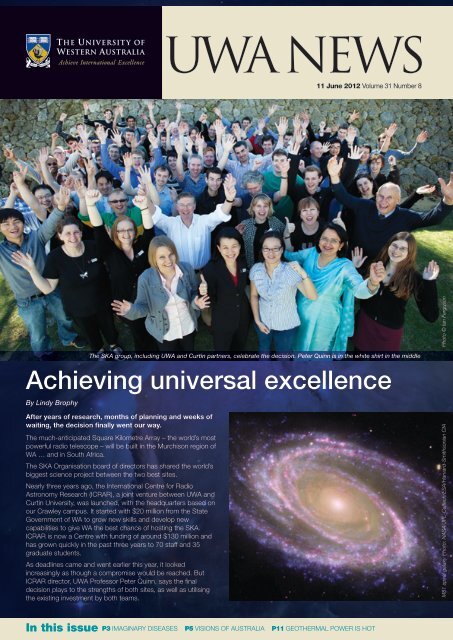
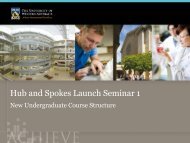
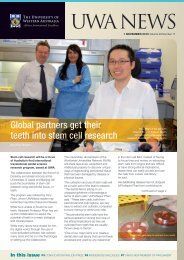
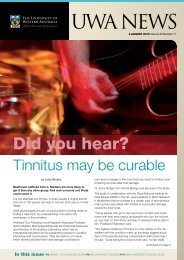
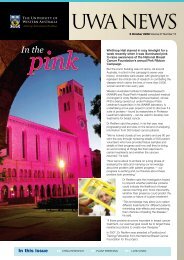
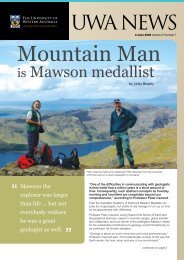
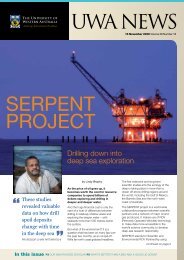
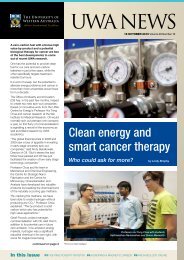


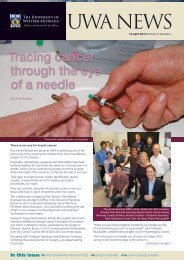
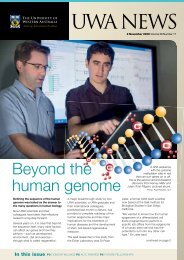
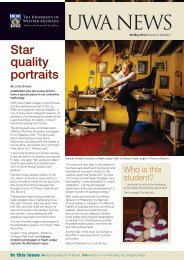
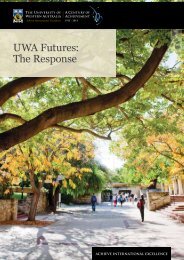
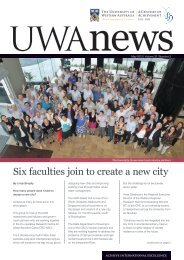
![Issue 13. 6 September 2010.pdf [PDF File, 1.7 MB] - UWA Staff - The ...](https://img.yumpu.com/26619782/1/184x260/issue-13-6-september-2010pdf-pdf-file-17-mb-uwa-staff-the-.jpg?quality=85)